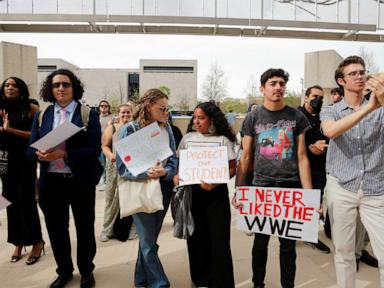Republican senators are brushing off concerns that high-profile arrests and deportations of foreign students may ostracize a group that is a major contributor to the U.S. economy.
International students injected $43.8 billion into the U.S. last year, a key economic influx that has rebounded from a major downturn during the pandemic. California, New York and Texas are the states with the highest rate of foreign students.
But some Republican senators say Secretary of State Marco Rubio’s student visa cancellations, high-profile arrests and push for deportations of student protesters are about protecting American national security, though many of the exact charges are unknown and sealed in the courts.
While Rubio said he has canceled more than 300 visas, it's unclear how many of those are for foreign students.
“They can be” an asset to the U.S. economy, Sen. Ted Cruz (R-Texas) said of the students. But he put his full support behind the Trump administration’s rooting out individuals it says are supporting or sympathizing with terrorist organizations, though lawyers and advocates say they are only exercising free speech.
“I hope it has a chilling effect on antisemites and racists and those who would engage in violent harassment from coming to this country,” Cruz said. “I’d like all of them to stay away and those who are here to promptly go home to their own countries and not threaten Americans here at home.”
Sen. Tommy Tuberville (R-Ala.), former head football coach at Auburn University, said foreign students can be an asset to the U.S. economy, but falsely claimed that they are taking university slots from Americans.
“The problem is we’re turning down a lot of qualified students in America that are being replaced by foreign students, and that shouldn’t happen,” Tuberville said.
Referred to as the “enrollment cliff,” colleges are preparing for drops in applications as the number of young Americans are declining.
College enrollment has been on a downward slope since the recession as birth rates in the U.S. have also slowed. According to the Centers for Disease Control and Prevention, birth rates have gone down 23 percent from 2007 to 2022.
Attendance from foreign students has rebounded since the pandemic, with a record 1.1 million in the U.S. in the 2023-2024 school year.
With the rise in enrollment of international students, the amount these individuals spend in the U.S. also saw a spike of $43.8 billion, according to data collected by the Association for International Educators and JB International.
They also make up a valued part of the workforce, as foreign-born students who get their degrees in the U.S. often stay after they graduate. One out of every four billion-dollar startups in America was created by former international students, according to a 2018 study by the National Foundation for American Policy.
But universities and advocates say the U.S. political atmosphere and public arrests are raising concerns over foreign students' safety and could contribute to a decline in those choosing the U.S. as a destination for overseas studies.
The administration has created an environment “terrorizing students and faculty for their exercise of First Amendment rights in the past, intimidating them from exercising ...











